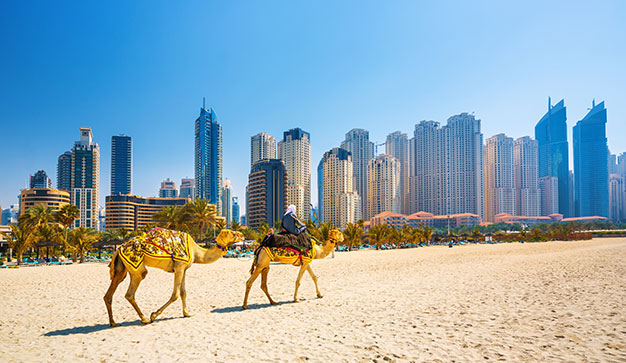11 things you should prepare for when moving abroad
7 March 2022

Becoming an expat is an incredibly exciting time but it’s not a decision to be taken lightly. Most of all it’s important not to get so carried away with the excitement that you neglect the planning process.
Undoubtedly, some things will take care of themselves when you move abroad but for other (more practical) matters, you will need to prepare - often putting things in place before you catch your flight. With this in mind, here are 11 things you should prepare for when becoming an expat.
9 things that you need to be proactive about:
1. Banking and finance

One of the most difficult areas to navigate as an expat is managing your finances. The financial implications of living overseas are complex and wide-ranging. Firstly, you’ll have to make plans for international banking because using your home bank account could get very expensive very quickly – owing to currency exchange rates and transfer fees. You should look into other options, such as opening a local account, and find out what works for you. In connection with this, you should research the cost of living and make absolutely sure that you can afford life as an expat.
Some destinations are more expensive than others and you’ll need to ensure your incomings will comfortably exceed your outgoings. Above all, before you commit to becoming an expat you should draw up a budget and check that your dream is realistic - or else it could become a nightmare.
2. Expat insurance

Living overseas can expose you to additional risks, so it’s worth looking into the different types of insurance you might need to protect yourself and your family should the worst happen.
There are a variety of options and you’ll want to tailor your coverage to suit your particular needs and budget. Health insurance, for example, is one of the most vital forms of expat insurance as your life, or the life of a loved one, could very much depend on it. Should the unthinkable happen, you may also need life insurance to ensure your dependents have an income to settle your financial affairs. Likewise, travel insurance is definitely one to consider now that you’re a globetrotter with places to be and people to see.
3. Expat investment

As an expat, you’ll want to make your savings work harder for you whilst living abroad. There are however a multitude of investment options to consider and finding the right ones can be tricky. One of the biggest questions to ask yourself when formulating your new investment strategy is how long you intend to stay as an expat. Then you’ll need to think about how much you’re prepared to invest, your attitude to risk, what tax you’ll be subject to and finally how you can access your money. Your long-term future could very well depend on the performance of your investments, so don’t make the mistake of letting them fall by the wayside during the years you’re abroad.
Remember that wherever you are in the world there will be many opportunities - including financial ones – so take advantage of them. If in doubt, consult a professional who specialises in giving financial advice to expats.
4. Expat pensions

Opting to become an expat can significantly impact your pension pot. It’s an important factor to consider as you don’t want to reach retirement age wishing you’d done something differently – by then it’ll be too late. You should find out what will happen to your pension when you move abroad, how you can manage it and what tax you can expect to pay. It might also be the case that you can no longer pay into a scheme in your home country. If this happens, keep in mind that you should try to avoid creating lots of small pension pots in numerous countries across the world.
Ultimately, pensions are a highly specialised area and you may need help working out how to consolidate your money. If in doubt speak to a professional, such as a financial adviser, and they will help you stay on track.
5. International Tax

International Tax adds another layer of complexity to your financial situation and it can be difficult to ensure you don’t pay more than is due. As a general rule of thumb, you can expect to pay tax in the country that your income is earned in, but many countries will also expect you to file tax returns even if you’re not currently residing there. You might find you qualify for a tax rebate, however bear in mind that every country will have its own laws.
The best course of action therefore would be to consult your new employer as to what tax you’ll be expected to pay and to also consult a financial adviser who specialises in this area. It’s important to have a good grasp of what taxes you’ll be expected to pay before hopping on a plane, because there can be serious consequences should you get it wrong.
6. Securing accommodation

Finding affordable housing in a convenient location near to your place of work can be a challenge. Prior to leaving, you should think about joining some Facebook groups for accommodation, getting in touch with agencies, and reaching out to people in your network who might be able to offer help.
Try to do as much research as you can but keep in mind that you can only do so much in advance. Viewings, making offers, and providing required documentation is often something you will need to do in person. Still, it will be helpful and a huge weight off your mind if you arrive in your new country with at least some idea of where you want to be based and what’s considered reasonable in terms of housing prices.
7. Finding a good expat school

For families moving abroad, finding a school that offers the best education for your children can be a challenge.
Do your homework beforehand and draw-up a short-list of suitable schools – perhaps referring to other expats who have been there before and know the lay of the land. Think about what’s most important to you and your children, and allow this to inform your choice – specifically you will want to look at the curriculum and the qualifications your children want to attain. In connection with this, don’t forget that standards and qualifications can vary between countries.
Other important factors to consider are the schools attitude to multi-lingual learning (if applicable) and, of course, what you can afford.
8. Study the language intensively

If you’re moving to a new country where you don’t speak the language (or you’re a little rusty), try and learn as much as possible beforehand. It can be very frustrating if you can’t read important documents, or if you need to speak to a professional – like a doctor – and they don’t speak your language. Being able to communicate will make the transition much easier and help you feel more settled. You could try enrolling in a language class or self-study.
Moreover, if you happen to know someone who speaks the main language in your destination country, practice speaking with them prior to your departure. You’ll probably find your language skills will come on leaps and bounds once you’re living as an expat and are immersed in the new culture. Nevertheless, it will be invaluable to know the basics in the early days.
9. Making friends

Making friends as an adult can be daunting and you’ll need to put in a little more effort as an expat. Start by heading out to meet-up events and getting together with new acquaintances. It might feel strange to put yourself out there, but having regular social events will help overcome the initial loneliness – and by meeting more people, you’ll have opportunities to form closer relationships.
Some other good ways to meet people include signing up to a language class, joining a group where you can also practice a hobby, going for after work drinks, or spending some time volunteering. Making friends can take time but it’s worth the effort especially during the low points – which will happen at some point and is all part of the process.
And 2 things that should take care of themselves:
10. Acclimatising to your new country’s culture

Even if you move to a country where people speak your language, you will still initially feel like you’ve travelled to another planet. This acclimatisation period, also known as ‘expat culture shock’, can feel overwhelming and the key to riding it out is being prepared for it to strike. Accept that things will feel unfamiliar and remind yourself that this is just a phase you can and will pass through.
Some take longer to settle in than others but hang in there and don’t make any rash decisions about your move. With an open mind and a little patience, you’ll likely find it isn’t long before you start feeling at home in your new country.
11. Getting over the homesickness

Moving house is one of the most stressful things you can experience; add to this you’ve just moved to an entirely different country. Even if you’ve moved with your family, it’s only natural that the experience will feel a little emotionally draining at first. You might have started a new job and feel a little on the back-foot, but this is all part of finding your feet as an expat.
It might also feel overwhelming to miss out on events back home but remind yourself that feeling homesick now and then is inevitable. One of the most important things you can do is mentally commit to living in your new country; after all, missing home doesn’t mean you’ve made a mistake, it just means you have people at home that you miss. Use technology to stay connected but not too much – remember you have an exciting new home to get out into and explore!